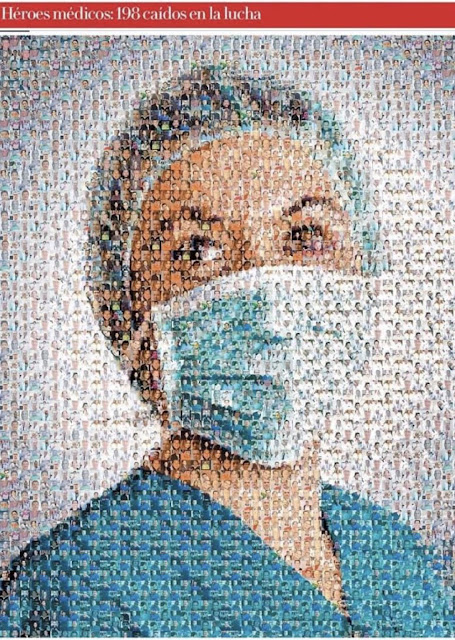Durante la pandemia la sanidad ha recibido ayudas en forma de parches. Primero se buscaron mascarillas y medidas de protección debajo de las piedras. Debería de haber existencias pero no las había. Luego se buscaron servicios de salud pública, debería haberlos pero no eran suficientes. Más tarde se buscaron UCIS y respiradores, las que había se habían quedado cortas.
Una de las lecciones aprendidas es que no estamos preparados para la catástrofe. Y deberíamos darnos cuenta puesto que vivimos en la época de las catástrofes.
Por otro lado hemos de constatar los profesionales de la sanidad se han visto sobrecargados al límite durante mucho tiempo. ¿Cuánto es posible estirarlos?
Los anuncios de auxilio por sobrecarga que los profesionales de Atención Primaria llevamos lanzando a nuestros jefes y a la sociedad no han sido escuchados. En este momento estamos en una fase de ineficiencia estructural. El exceso de presión asistencial disminuye la resolubilidad, eficiencia y calidad de la atención, empeora la seguridad del paciente, aumenta la ley de cuidados inversos y deja de atender adecuadamente a los más enfermos o vulnerables.
La situación de tensión es tal que el malestar de los profesionales es máximo. Si rara vez ha habido consenso entre ellos imagínense ahora. Multiplíquenlo incluyendo los niveles de media y alta gestión. Los políticos aducirán que no hay más recursos para sanidad pero no moverán un dedo para hacer los cambios estructurales que necesariamente serán políticamente costosos por impopulares. Y con más parches la situación es imposible que mejore, el objetivo lleva mucho tiempo siendo que el cadáver no huela mucho para que pase al siguiente.
El mayor problema es que va a llegar el momento en que el muerto se nos desmorone como arena. Ya estamos viendo signos evidentes, los médicos jóvenes se marchan de la sanidad pública o abandonan las especialidades o destinos más ingratos. El número de plazas “de difícil cobertura” no deja de crecer. Los médicos mayores cada vez están más quemados o en modo supervivencia, lo que empeora más si cabe los resultados asistenciales, aguantando como pueden hasta la jubilación. Que por cierto en los próximos años será masiva con la salida del sistema de un 25% de los efectivos, que no tendrán reemplazo.
Algunos interesados dicen que digitalizando el sistema se arreglará todo. Otros venden imaginativas soluciones de gestión que prometen mejoras. Incluso alguno defiende que los apaños con la gestión privada son una solución. El hecho es que no se puede devolver la salud a un enfermo grave con bebedizos a base de refresco. Pero nadie se atreve a aplicar un desfibrilador que inyecte gran cantidad de energía en poco tiempo. Nos tiembla la mano con solo pensarlo. Y el paciente en parada cardiaca se nos va.
Hemos fracasado en el mantenimiento del modelo. Los sistemas complejos requieren de permanentes labores de mantenimiento que implican cuidar desde los sistemas de información hasta las necesarias convocatorias de oposiciones anuales. Si no se cuidan bien se estropean con mucha facilidad y rapidez y la avería consecuente es terriblemente cara. Y así vamos, acumulando ineficiencias, ineficacias y averías. La factura es tan elevada que ningún partido político se atreve a afrontarla prefiriendo la ruin y cobarde estrategia de no hacer nada y que pague el siguiente.
La sociedad no es consciente de la situación. De momento las colas no son excesivas y las cosas parecen funcionar como siempre. Uno acude al centro de salud o al hospital y milagrosamente no tiene que pagar, eso es lo bastante increíble como para no hacer más preguntas. Por eso casi nadie se implica en la defensa de una sanidad pública que aparentemente sigue gozando de buena salud aunque el dictamen experto haya certificado hace tiempo la agonía. Bastantes problemas tenemos ya para incluir la sanidad…
Sin embargo lo que veremos los siguientes meses es un bloqueo de la Atención Primaria que aumentará gasto y trasladará la saturación primero a las urgencias y luego a los hospitales que volverán a ver crecer sus listas de espera como la espuma. Volverán las colas. Quien quiera rapidez que vaya al seguro privado de salud que ya paga un tercio de la población de Madrid, eso que llaman libertad. Dos velocidades, dos sanidades, dos Españas.
Restarting healthcare.
During the pandemic, the spanish health care systems has been patched up. First, masks and protective measures were sought under the rocks. There should have been stocks, but there were none. Then public health services were sought, there should have been, but there were not enough. Later, we looked for ICUs and respirators, which were in short supply.
One of the lessons learned is that we are not prepared for catastrophe. And we should realise this because we live in the age of catastrophes.
On the other hand, we have to note that health professionals have been stretched to the limit for a long time. How far can they be stretched?
The announcements of relief from overload that we primary care professionals have been making to our bosses and to society have gone unheeded. At the moment we are in a phase of structural inefficiency. Excess care pressure reduces the resolubility, efficiency and quality of care, worsens patient safety, increases the law of reverse care and fails to adequately attend to the sickest or most vulnerable.
The situation of tension is such that the unease of the professionals is at its peak. If there has rarely been consensus among them, imagine now. Multiply this to include middle and senior management levels. Politicians will argue that there are no more resources for health but they will not lift a finger to make the structural changes that will necessarily be politically costly and unpopular. And with more patches, the situation cannot possibly improve; the aim has long been for the corpse not to smell too much so that it can move on to the next one.
The biggest problem is that the time will come when the dead body will crumble like sand. We are already seeing obvious signs, with young doctors leaving the public health service or abandoning the most thankless specialities or destinations. The number of "difficult to fill" posts is growing all the time. Older doctors are increasingly burnt out or in survival mode, which makes the results of their care even worse, and they are hanging on as best they can until retirement. In the next few years, by the way, this will be massive, with 25% of the workforce leaving the system without replacement.
Some stakeholders say that digitising the system will fix everything. Others sell imaginative management solutions that promise improvements. Some even argue that private management arrangements are a solution. The fact is that you can't restore a seriously ill person to health with soft drink-based drinks. But no one dares to use a defibrillator that injects a large amount of energy in a short time. Our hands tremble at the thought of it. And the patient in cardiac arrest leaves us.
We have failed to look after the model. Complex systems require permanent maintenance work that involves taking care of everything from information systems to the necessary annual competitive examinations. If they are not well looked after, they break down very easily and quickly, and the consequent breakdown is terribly expensive. And so we go on, accumulating inefficiencies, ineffectiveness and breakdowns. The bill is so high that no political party dares to face it, preferring the dastardly and cowardly strategy of doing nothing and letting the next one pay.
Society is not aware of the situation. For the moment the queues are not excessive and things seem to work as usual. You go to the health centre or hospital and miraculously you don't have to pay, that's incredible enough not to ask any more questions. That is why hardly anyone is involved in the defence of a public health system that is apparently still in good health even though expert opinion has long since certified its death throes. We already have enough problems to include the health system...
However, what we will see in the coming months is a blockage of primary care, which will increase spending and transfer saturation first to the emergency department and then to the hospitals, which will once again see their waiting lists grow like wildfire. The queues will return. Those who want speed should go for private health insurance, which is already paid for by a third of the population of Madrid, that thing some call freedom. Two speeds, two health systems, two Spains.
重新启动医疗保健。
自动翻译,抱歉有错误。
在大流行病期间,保健工作一直在进行修补。首先,在岩石下寻找口罩和保护措施。应该有库存,但没有。 然后寻求公共卫生服务。然后寻求公共卫生服务,本来应该有的,但没有足够的服务。后来,我们寻找ICU和呼吸机,这些设备都很紧缺。
其中一个教训是,我们没有为灾难做好准备。我们应该意识到这一点,因为我们生活在灾难的时代。
另一方面,我们必须注意到,卫生专业人员长期以来一直被压榨到极限。 他们能被压榨到什么程度呢?
我们初级保健专业人员一直在向我们的老板和社会宣布缓解超负荷工作的消息,但却无人理睬。目前,我们正处于结构性低效的阶段。过度的护理压力降低了护理的可解决性、效率和质量,恶化了病人的安全,增加了反向护理的法则,并且不能充分照顾到最生病或最脆弱的人。
紧张的情况下,专业人士的不适感达到了顶峰。如果他们之间很少有共识,那么现在可以想象。乘以这个数字,包括中层和高层管理水平。政客们会争辩说,没有更多的资源用于健康,但他们不会动一根手指头来进行结构性的改变,而这种改变必然是政治上昂贵的、不受欢迎的。而随着更多的补丁,情况不可能得到改善;长期以来,我们的目标是让尸体不要闻到太多的气味,以便它可以继续下一个。
最大的问题是,时间一到,死人的身体就会像沙子一样碎裂。我们已经看到了明显的迹象,年轻的医生离开了公共卫生服务部门,或者放弃了最无益的专业或目的地。"难以填补 "的职位数量一直在增加。老年医生越来越焦头烂额,或者处于生存状态,这使得他们的护理结果更加糟糕,他们在退休前都在尽力坚持。顺便说一下,在未来几年,这将是大规模的,25%的劳动力将离开系统而不被替换。
一些利益相关者说,将系统数字化将解决一切问题。另一些人则出售富有想象力的管理解决方案,承诺会有改进。有些人甚至认为,私人管理安排是一种解决办法。事实是,你不可能用软饮料为主的饮料让重病患者恢复健康。但是没有人敢于使用在短时间内注入大量能量的除颤器。一想到这个,我们的手就会颤抖。而心脏骤停的病人离开了我们。
我们没能维持这一模式。复杂的系统需要长期的维护工作,包括照顾到从信息系统到必要的年度竞争性考试的一切。如果它们没有得到很好的照顾,它们就非常容易和迅速地发生故障,而随之而来的故障是非常昂贵的。就这样,我们继续前进,积累低效、无效和破损。这笔账单是如此之高,以至于没有一个政党敢于面对它,他们更愿意采取卑鄙懦弱的策略,即什么都不做,让下一个人付出代价。
社会并不了解这种情况。目前,排队人数并不多,事情似乎照常进行。你去保健中心或医院,奇迹般地不用付钱,这已经很不可思议了,不需要再问什么了。这就是为什么几乎没有人参与捍卫公共卫生系统的原因,尽管专家意见早已证明它的死亡阵痛,但该系统显然仍处于健康状态。我们已经有足够的问题,包括卫生系统...
然而,在未来几个月里,我们将看到的是初级保健的堵塞,这将增加支出,并将饱和度首先转移到急诊室,然后转移到医院,医院将再次看到其等待名单像野火一样增长。队列将返回。那些想要速度的人应该去购买私人健康保险,马德里三分之一的人口已经支付了这种保险,他们称之为自由。两种速度,两种卫生系统,两个西班牙。



No hay comentarios:
Publicar un comentario
También puede comentar en TWITTER a la atención de @DoctorCasado
Gracias.
Nota: solo los miembros de este blog pueden publicar comentarios.